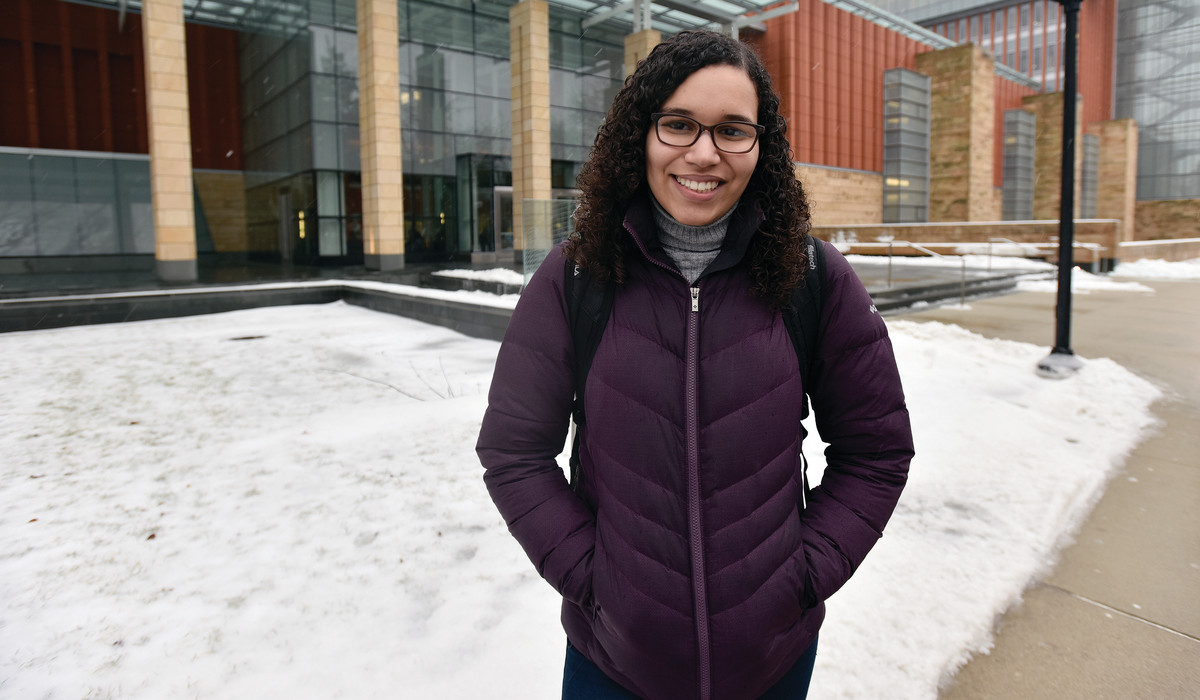It’s early November, but U-M junior Tihnae Bennett is starting to pack, with plans to leave her room in Betsy Barbour by Nov. 20 and head home to Kalamazoo, Michigan, for the remainder of the academic year. It’s an early, but fitting, end to an on-campus experience that she hoped would retain some semblance of normalcy during this era of COVID-19.
The fall term started with strict guidelines in place for students, faculty, and staff — from committing to face coverings and social distancing to conducting most classes remotely — in an effort to keep the disease at bay. But on Oct. 20, a rise in COVID-19 cases on campus prompted U-M and the Washtenaw County Health Department to issue a 14-day stay-in-place order for undergraduates on the Ann Arbor campus. Students were told they could leave their homes only for a small number of reasons, including in-person classes, medical appointments, and voting.
Then came the Nov. 6 announcement of the University’s winter term plan. Informed by the fall term experience, the plan included a provision that undergraduate students who do not need to live on campus should remain at their permanent residences rather than return from break. At that point, and despite persevering through the ups and downs of the fall term, Tihnae made plans to head home.
This wasn’t the way the sociology and social work major wanted the first semester of her junior year to play out. And what a semester it was.
When she arrived on campus in August, Tihnae knew things would be different, but not how different.
“We got a glimpse of what online classes would be like at the end of winter semester last year, when we all got sent home,” she recalls. “My classes are all online, but I decided to come back. When I’m here, I‘m motivated to work. When I go home during breaks, I’ve been inclined to watch TV and socialize.”
With some classes prerecorded and others on Zoom in real time, it isn’t easy to go to class in Ann Arbor, either. She has found it hard to stay on track for prerecorded classes she is free to watch when she likes. “It’s so easy to procrastinate,” she says. “If it were an in-person class, I would go to class and know that if I didn’t, I’d miss it altogether. … You can’t ask questions during a class that the teacher recorded earlier.”
She doesn’t find Zoom classes ideal, either, even though they occur in real time. “It can be awkward looking at other students — I don’t know them, but they’re on the screen with me.”
She acknowledges that everyone at U-M is in the same boat. “The professors have had to change the way they teach, and it’s hard for them, also. A lot of my friends are stressed about classes and the way they’re scheduled, too.”
On that early November day, she finishes dinner in her room, alone, and waits for a Zoom meeting of the Black Student Union (BSU) to begin.
Participation in campus organizations has always been a big part of her extracurricular life. In her freshman year, Tihnae — a business minor — was on the executive board of the Black Business Undergraduate Society. This year, she serves on the BSU board as external relations chair, which means organizing Zoom events. All of her extracurricular meetings and activities are online, including those with her sorority, Sigma Gamma Rho, where she is vice president.
“It’s part of the Divine Nine,” she says, referring to the coalition of nine historically Black intercollegiate fraternities and sororities with a mission of community service and positive social change. “Before the coronavirus, we went into communities. We cooked meals at the Ronald McDonald house in Ann Arbor. We had a breast cancer drive.”
Now they meet online and do what they can.
Tihnae also has a part-time job as a research assistant in sociology. “I review data about Black scholars and see if there are any patterns or trends.” She does this online these days, too.
As for her social life, well, that’s mostly on Zoom or Facetime, too, causing occasional headaches from an overabundance of screen time. “We can invite people into our room but only if they live in our dorm,” Tihnae says. “Outside friends, even students from other dorms, aren’t allowed to visit. I stay in my room most of the time and just see one friend in the dorm occasionally.”
This is a major change from her pre-COVID life. “I was never by myself. If not for COVID-19, I’d be out doing something with other people — going to classes or events or just hanging out with my friends.”
Many of Tihnae’s friends didn’t return to campus, and a few live off campus, including three who share an apartment that isn’t within walking distance. Occasionally, but not often, they drive over to get her — she wears a mask. She thinks about how she’ll miss that, as she prepares to head home to Kalamazoo.
Among the other activities that have changed from pre-pandemic days are football games. “I miss the camaraderie, the chanting together, all the energy in the stands,” she says. “I miss waking up early and getting dressed up in Michigan gear — football isn’t the same on TV.”
Perhaps her most adventurous activity is walking to the Michigan Union to pick up something to eat. Everyone wears masks on food lines, which are roped off and marked to maintain social distance. People can sit at some of the tables, but many are blocked off. “I always take my food back to my room,” she says.
Tihnae says her parents felt the decision to return to campus was hers; they just urged her to be careful and safe, something she wishes all of her fellow students prioritized.
“I wish every student took this seriously. Even though there are blue dots in the line for dinner at the dorm, so we can be sure that we’re 6 feet apart, there are people who ignore the dots and get way too close to me. I have to ask them, ‘Hey, would you please back up?’ Sometimes, it makes me a little mad.”
While the fall term has been stressful, Tihnae has found several ways to cope, including engaging with the community of LEAD scholars to which she belongs.
“We usually have community events throughout the semester,” she says. “Some are social, and some are workshops for professional and personal development. They’ve done a good job of putting many of these online this semester. I’ve been to a couple. There was a wellness workout event. The events are optional, and I don’t go to all of them, but just knowing they’re continuing helps me.”
She also talks with her friends, parents, and mentors, and it reminds her that she’s not the only one feeling what she feels. “Most of my mentors have graduated now, but we’re still in contact. And I’m close to my academic adviser.”
Back in her room, Tihnae continues to pack. She dreams about all the opportunities she’ll pursue when the pandemic ends — simple things she once took for granted.
“I can’t wait to be able to hang out with friends and go to class again. I can’t wait to go to the Big House!”
Davi Napoleon, ’66, MA’68, is a freelance journalist. A theater historian with a Ph.D. from NYU, she is author of “Chelsea on the Edge: The Adventures of an American Theater.”





